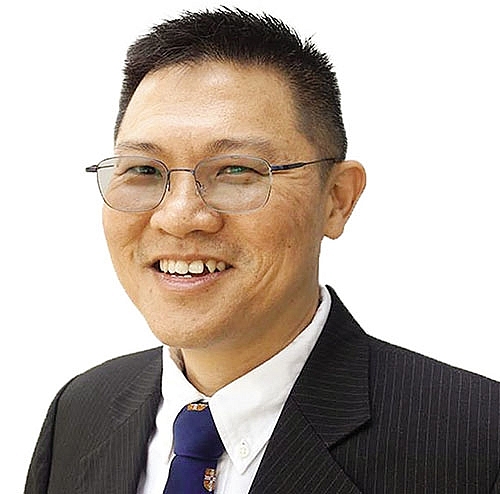Popularising A-Levels in Vietnamese schools
 |
| Melvyn Lim |
Most schools applying the Cambridge curriculum in Vietnam are in the private sector. What are the reasons behind supporting private schools rather than public schools in meeting Cambridge standards?
As many Vietnamese parents lack the ability to pay high fees to send their childrem to international schools despite the wish of giving them the best education, the appearance of increasing private schools offering an international curriculum with more reasonable fees have partly met the local demand so far. However, with more comfortable costs, private schools have differences in terms of facilities, teacher quality, and other resources against the full international institutions. Many public schools have yet to meet international standards. Therefore, we choose to work with private schools, offering the Cambridge curriculum to help them teach more students at more affordable prices.
We also understand that most of them are run by Vietnamese principles and they often do not have the ability to pay a full team of fully-qualified foreign teachers. Therefore, we are looking at this and have been slowly upgrading private schools to the standards of international schools. We are looking at the private schools and trying to ensure they get better every year. They need time to properly understand international education, to improve, and to attain the correct resources.
What is the most important factor in getting a good education and have your schools achieved this?
We define a good education across four parts. These are the curriculum, the teaching, the learning, and assessments, and all of them must be aligned. Everything we do is to put the students at the centre of the four parts. Therefore, parents need to understand that each of these areas is separate, and each area can be achieved successfully if the teachers understand each of the steps. That is the difficult part. One of the best ways to understand whether schools are good or not is by the amount of resources they have, or how much investment is put in to training teachers. To date, these are still big problems across many Vietnamese schools.
For a big school, training teachers is a major investment and it can take several years for teachers to adapt to the relevant curriculum. To fix these and other problems, The CAIE annually offers many training courses for teachers but only a few schools have sent their teachers to these courses.
What is the A-Level qualification and the CAIE’s plan of popularising this type of qualification in Vietnam?
The A-Level, or Advanced Level, is a subject-based qualification conferred as part of the General Certificate of Education, as well as a school-leaving qualification offered by educational bodies in the UK and educational authorities of British Crown dependencies to students completing secondary or pre-university education. Obtaining an A-Level is generally required for university entrance.
The qualification is recognised for admission by British universities as well as universities in the US, Canada, the EU, the Middle East, New Zealand, and many other locations.
We work with Vietnam National University in Ho Chi Minh City and Hanoi. In the next few years, universities can accept students with A-Level qualifications. In some cases, students do not need to have a national diploma, and some private schools focus on providing international education only.
How do you assess the local education market, and what is CAIE’s strategy for expansion in Vietnam?
The potential here is huge. Vietnamese people are focused on providing good education to their children. On the policy side, Vietnam is gradually legalising the market. The Ministry of Education and Training’s new Decree No.86/2018/ND-CP allowed up to 50 per cent, instead of previous 10-20 per cent, of Vietnamese students to learn in foreign-invested schools. Thanks to this, more overseas investors are interested in the local market.
In addition, income level of Vietnamese citizens has increased. Now, more people can afford to pay higher-level fees and good education, or to send their children overseas. The trend of investment in private education will keep growing.
As for the CAIE, a huge number of local schools have contacted with the hopes of becoming the next Cambridge schools in Vietnam. However, the process of selection is very strict and we have to examine them carefully, and this is where our focus lies.
What the stars mean:
★ Poor ★ ★ Promising ★★★ Good ★★★★ Very good ★★★★★ Exceptional
Related Contents
Latest News
More News
- Tet event in Japan celebrates success of 14th National Party Congress (January 25, 2026 | 10:04)
- 14th National Party Congress wraps up with success (January 25, 2026 | 09:49)
- Congratulations from VFF Central Committee's int’l partners to 14th National Party Congress (January 25, 2026 | 09:46)
- List of newly-elected members of 14th Political Bureau announced (January 23, 2026 | 16:27)
- 14th Party Central Committee unanimously elects To Lam as General Secretary (January 23, 2026 | 16:22)
- List of members of 14th Party Central Committee announced (January 23, 2026 | 09:12)
- Highlights of fourth working day of 14th National Party Congress (January 23, 2026 | 09:06)
- Press provides timely, accurate coverage of 14th National Party Congress (January 22, 2026 | 09:49)
- Press release on second working day of 14th National Party Congress (January 22, 2026 | 09:19)
- Minister sets out key directions to promote intrinsic strength of Vietnamese culture (January 22, 2026 | 09:16)

 Tag:
Tag:



















 Mobile Version
Mobile Version